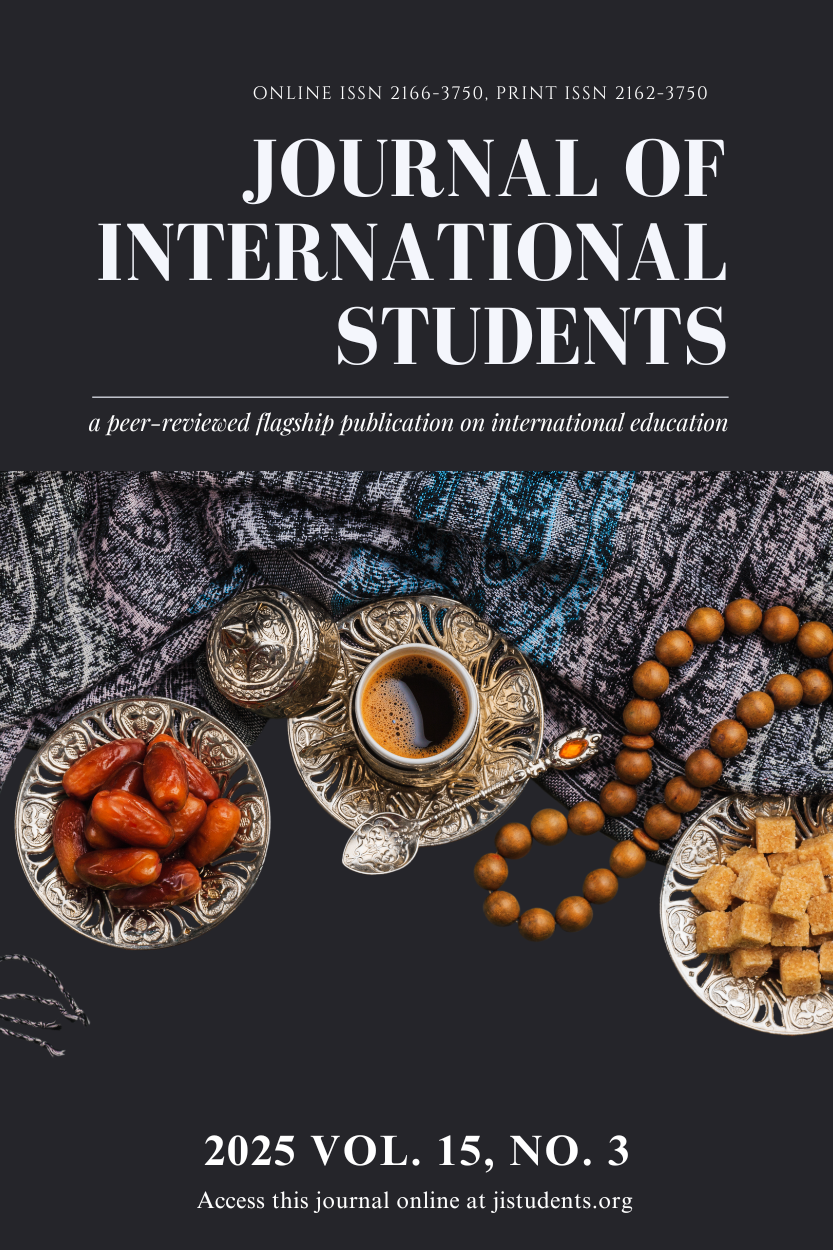The predictive ability of cultural intelligence and character orientations for psychological adaptation in expatriates
DOI:
https://doi.org/10.32674/1tb65j82Keywords:
cultural intelligenceAbstract
This study investigated the predictive relationships between cultural intelligence (CQ), personal orientation, and psychological adaptation among 193 expatriate students at the University of Jordan. The results revealed a significant positive correlation between CQ, personal orientation, and psychological adaptation. Regression analysis indicated that motivational CQ was the strongest predictor of psychological adaptation (62.5%), with a 73.2% prediction combined with metacognitive CQ. Productive personal orientation also demonstrated a significant predictive relationship with adaptation (52.1%). Interestingly, the cognitive dimension of CQ exhibited lower predictive power than the motivational and metacognitive dimensions, suggesting the importance of action-oriented and reflective capacities over purely knowledge-based components. Additionally, gender differences emerged, with females showing higher levels of CQ and psychological adaptation. While CQ and personal orientation both influence adaptation, their independence from one another suggests distinct pathways.
References
Abdulghani, F., & Al-Rabie, F. (2024) The predictive ability of cultural intelligence and psychological toughness in academic adaptation among university students within the green line, Jordan Society for Educational Sciences, Jordanian Educational Journal, 9(3), 305-329. DOI: https://doi.org/10.46515/jaes.v9i3.821
Adham, S., & Nassif, N. (2022) An analytical study of the psychological adaptation of the faculty of the faculties of physical education and sports sciences in Baghdad when they use e-learning, Journal of Modern Sports, 21(1), 57-64.
Alazzam, A. A., Al-Shokran, A. A., Suleiman, B. M., Rababah, M. A., Al-Hawamdeh, B. M., Al-Maraziq, I. A., Tanjur, I., & Al-Khabis, F. A. (2024). Relationship between psychological stress and mindfulness among outstanding students in primary school education. Education and Science, 26(4), 148–168. https://doi.org/10.17853/1994-5639-2024-4-148-168 DOI: https://doi.org/10.17853/1994-5639-2024-4-148-168
Al-Battoush, H., & Al-Sarayra, R. (2024) The role of cultural intelligence as a mediating variable in the relationship between psychological adaptation and academic adaptation among Mutah University students, Jordanian Educational Journal, 1(2), 647-671. DOI: https://doi.org/10.46515/jaes.v9i1.599
Al-Fakhri, S. (2018). The psychology of intelligence. Dar Al-Kitab.
Alhabies, F. (2021). The relationship between family socialization patterns and attitudes toward drug use among users and addicts of cannabis and alcohol who wish to be treated in private clinics in Amman, Jordan. Jordan Journal of Pharmaceutical Sciences, 14(4),391-401. https://archives.ju.edu.jo/index.php/jjps/article/view/107951
Al-Habies, F. (2022). Irrational beliefs among sciences and human sciences students at Isra University. Dirasat: Human and Social Sciences, 49(2), 573-582. DOI: https://doi.org/10.35516/hum.v49i2.1815
Al-Habies, F. A. M., Tarawneh, H., Al, I. D. A. A. N., Tarawneh, H. H., Dawaghreh, S. A., Jawarneh, A. I. A., ... & Alorani, O. I. H. (2024). The impact of the cognitive behavioral therapy (CBT) program on anxiety disorders and memory recall. Periodicals of Engineering and Natural Sciences, 12(1), 183-190. DOI: https://doi.org/10.21533/pen.v12.i1.29
http://dx.doi.org/10.21533/pen.v12i1.4005
Al-Rashidi, A. (2023) The degree of cultural intelligence among secondary school students in the State of Kuwait: An anthropological - educational approach to the study of intelligence, Journal of the College of Education, 47(4), 113--152.
Al-Shalahi, A., & Al-Khader, O. (2021) Alienation as a modified variable in the relationship between cultural intelligence and depression among a sample of expatriate and nonexpatriate Kuwaiti students, Journal of Educational and Psychological Studies, 16(3), 245-258.
Al-Shammari, S. (2023) Cultural intelligence as a building in psychological adjustment among expatriate faculty members at the University of Hail, Journal of Humanities and Social Studies, 50(6): 114-135.
D'souza, J., Dechapanprasong, W., Chan, C. & Ornla, O. (2003). Cultural adaptation: A mediator between cultural intelligence and academic performance in Thai context. Asia Social Issues, 16(5), 1-10. DOI: https://doi.org/10.48048/asi.2023.258480
Engler, B. (1991) Introduction to personality theories, translated by Fahd bin Dulaim, Taif, Literary Club.
Farhat, A. (2024). The relationship of psychosocial and cultural adaptation to cultural intelligence among a sample of national team. Sports Creativity, 15(1), 362-378.
Gebregergis, W.T., Huang, F., & Hong J. (2019). Cultural intelligence, age, and prior travel experience as predictors of acculturative stress and depression among international students studying in China. Journal of International Psychologist, 40(4), 575-600. DOI: https://doi.org/10.32674/jis.v9i2.964
Malay, E., Otten, S., Sabine; & Coelen, R. (2023). Predicting adjustment of international students: The role of cultural intelligence and perceived cultural distance, Research in Comparative and International Education, 18(3), 485-504. DOI: https://doi.org/10.1177/17454999231159469
Nunes, I. M., Felix, B., & Prates, L. A. (2017). Cultural intelligence, cross-cultural adaptation, and expatriate performance: A study with expatriates living in Brazil. Revista de Administração, 52(3), 219-232. DOI: https://doi.org/10.1016/j.rausp.2017.05.010
RStudio, P. T. (2024). RStudio: Integrated development environment for R. RStudio, PBC. https://www.rstudio.com/
Younis, A. W., & Hussein, M. (2022). Cultural intelligence and its relationship to personal attitudes among university students, Diyala Journal, 1(85), 75-105.
Downloads
Published
Issue
Section
Categories
License
Copyright (c) 2025 Journal of International Students

This work is licensed under a Creative Commons Attribution-NonCommercial-NoDerivatives 4.0 International License.
All published articles are licensed under a Creative Commons Attribution-NonCommercial-NoDerivs 4.0 Unported License.















